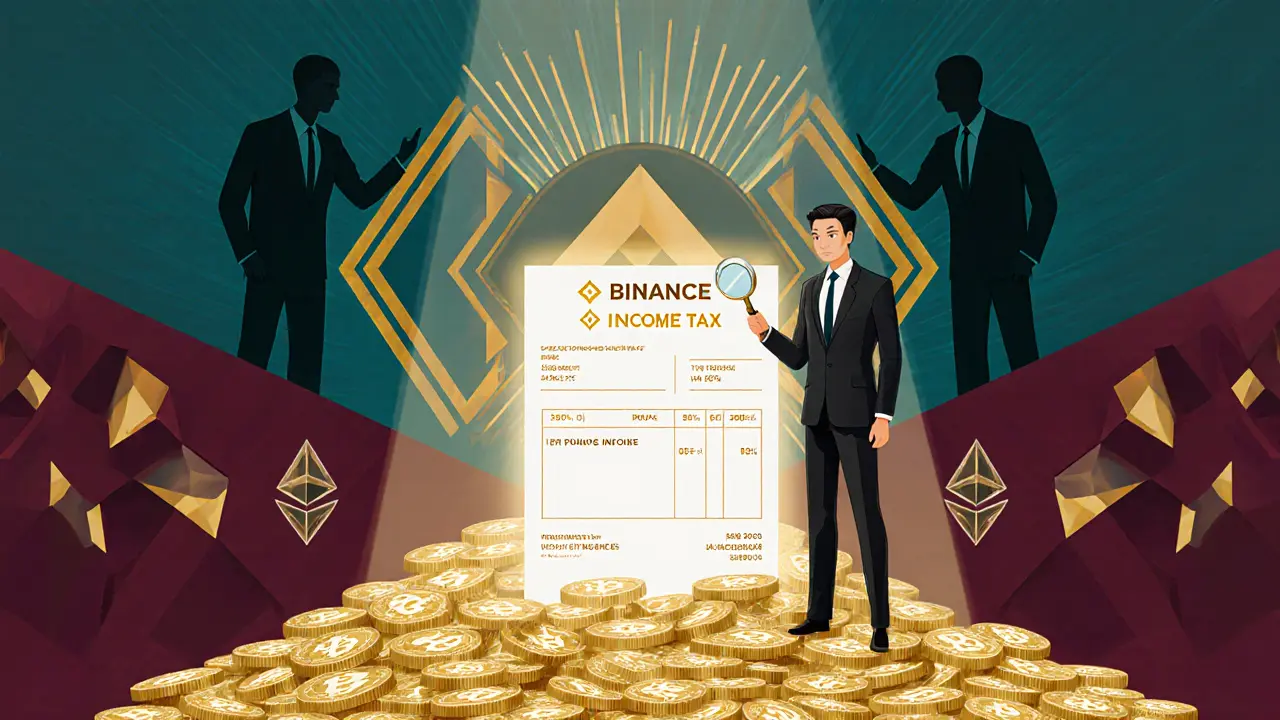Cryptocurrency Tax Calculator - Taiwan 2025
Tax Calculator for Crypto Traders
Calculate your potential tax liability for cryptocurrency transactions in Taiwan based on current regulations (2025).
Tax Calculation Results
VAT Calculation
Income Tax Calculation
Total Tax Liability
Important Notes
For Individuals: If your monthly sales exceed NT$40,000, you must register for VAT.
For Businesses: Must register for VAT regardless of sales volume.
Cost Basis: You must keep records of purchase prices to calculate accurate profit.
When you buy Bitcoin on BitoPro or sell Ethereum on Binance, you might think you’re just trading digital assets. But in Taiwan, those trades come with real tax consequences - and many people don’t realize it until the tax office comes knocking. Unlike countries that have created clear crypto tax laws, Taiwan hasn’t rewritten its tax code for digital assets. Instead, it’s forcing crypto into old rules meant for stocks, goods, and services. That creates confusion, risk, and unexpected bills.
Are cryptocurrencies taxable in Taiwan?
Yes. The Ministry of Finance treats cryptocurrency as a virtual commodity, not money. That means every time you trade, sell, or exchange crypto, you could owe taxes. There’s no official crypto tax law, but existing rules for business and income tax apply. The Financial Supervisory Commission (FSC) has been clear since 2014: crypto is speculative, risky, and not legal tender. But that doesn’t mean it’s tax-free.
If you’re a casual trader buying and selling on weekends, you might think you’re off the hook. You’re not. The tax system doesn’t care if you’re a hobbyist or a full-time trader. If you make money, the government wants its share.
Two taxes apply: VAT and income tax
Taiwan hits crypto traders with two layers of tax: a 5% value-added tax (VAT) and income tax at around 20%.
5% VAT on trading revenue applies if you’re selling crypto as part of a business. That includes anyone who trades regularly - even if you don’t have a company. If your monthly sales exceed NT$40,000 (about US$1,300), you’re required to register for VAT and pay 5% on every sale. That’s not just for big exchanges. It’s for individuals too.
For example, if you bought 0.5 BTC for NT$150,000 and sold it for NT$250,000, your revenue is NT$250,000. You owe 5% VAT on that amount - NT$12,500 - even before you calculate your profit. Many traders miss this and get hit with back taxes and penalties.
Foreign platforms like Binance aren’t automatically responsible for collecting this tax. But if you’re a Taiwanese individual buying from a foreign seller, and that seller doesn’t register, the tax burden shifts to you. If you’re buying from a foreign entity that sells to Taiwanese individuals (not just businesses), and your monthly purchases push them over NT$40,000 in revenue, they must register - or you could be liable.
Income tax on profits is the bigger hit. After you pay VAT, you still owe income tax on your net gain. The rate is typically 20% for individuals, based on your total annual income. But here’s the problem: most people don’t track their purchase cost.
Imagine you bought Bitcoin in 2020 for NT$80,000 and sold it in 2025 for NT$600,000. Your profit is NT$520,000. You owe 20% income tax on that - NT$104,000. But if you can’t prove the original purchase price? The tax office might assume your entire sale amount is profit. That means you could owe tax on NT$600,000 instead of NT$520,000. That’s a difference of over NT$16,000 in extra tax.
Who has to pay - individuals, businesses, or foreigners?
The rules change depending on who you are.
- Taiwanese individuals: Must register for VAT if monthly sales exceed NT$40,000. Must report all crypto gains as income. Keep receipts, wallet addresses, and transaction histories.
- Taiwanese businesses: Must register for VAT regardless of sales volume. Crypto gains are treated as business income. Tax rates vary based on corporate structure.
- Foreign individuals selling to Taiwanese buyers: Must register for VAT if their sales to individuals exceed NT$40,000/month. If they only sell to Taiwanese businesses, the buyer pays the VAT.
- Foreign companies with a Taiwan office: Must pay 5% VAT on all local crypto sales, same as local businesses.
- Foreign companies without a Taiwan presence: Generally not required to pay VAT unless they’re selling directly to individuals in Taiwan above the threshold.
Many people assume using a foreign exchange like Binance keeps them out of Taiwan’s tax net. That’s a myth. The tax obligation follows the buyer, not the platform. If you live in Taipei and trade crypto, you’re subject to Taiwan’s tax laws - no matter where the exchange is based.
The documentation problem
The biggest headache for taxpayers isn’t the tax rate - it’s proving what you paid.
Taiwan’s tax authorities don’t have access to blockchain data. They can’t see your wallet history. So if you bought crypto on an exchange that shut down, or you transferred from a personal wallet years ago, you might not have records. The tax office won’t accept “I think I bought it for $1,000.” They want bank statements, exchange receipts, or wallet import files.
Without proof of cost, the default assumption is that your entire sale amount is profit. That’s why keeping records isn’t optional - it’s your only defense. Save screenshots of purchase confirmations. Export transaction logs from exchanges. Use crypto tax software like Koinly or CoinTracker to auto-track your buys and sells.
One trader in Taichung got audited in early 2025 after selling $120,000 worth of crypto. He couldn’t prove his original cost. The tax office assumed he bought it for $0. He owed NT$2.4 million in income tax - nearly triple what he should have paid. He’s still fighting it in court.

What about mining, staking, and airdrops?
Taiwan hasn’t issued clear rules for these activities, but the Ministry of Finance has signaled they’ll be treated as income.
- Staking rewards: When you earn interest on crypto you’ve locked up, it’s considered income. Taxable at the fair market value when you receive it.
- Airdrops: If you get free tokens, you owe income tax on their value when you receive them - even if you don’t sell them.
- Miners: If you mine crypto as a business, you pay VAT on sales and income tax on profits. Equipment costs can be deducted as business expenses.
Many people assume airdrops are “free money.” They’re not. The tax office sees them as unearned income. If you receive 100 tokens worth NT$5,000 on a Tuesday, you owe tax on NT$5,000 that year.
Platforms and compliance
Taiwan’s 24 licensed crypto exchanges - including BitoPro, MaiCoin, and Binance Taiwan - are now required to collect real-name data from users. That’s part of the Anti-Money Laundering (AML) rules passed in 2024.
These platforms are not yet required to report your trades to the tax office. But they’re collecting your ID, phone number, and bank details. That means the Ministry of Finance could request your transaction history at any time. If you’ve been trading without reporting, you’re not anonymous - you’re just behind the curve.
The Taiwan VASP Association, formed by major exchanges, is working with regulators to build reporting systems. Experts expect mandatory tax reporting from exchanges to begin in 2026. That’s not speculation - it’s policy in motion.
What’s changing in 2025?
On November 18, 2024, the Ministry of Finance announced it was reviewing crypto tax rules. Why? Because prices surged after the U.S. election, and trading volume in Taiwan jumped 300% in six months. The current system - built on 1980s tax laws - can’t keep up.
Expect three major changes soon:
- Real-name verified platforms will be required to report annual trade summaries to the tax authority.
- Specific rules for calculating cost basis (how you prove what you paid) will be published.
- Penalties for undeclared crypto income will increase - possibly including criminal charges for repeated non-compliance.
The FSC has already classified security tokens as securities. That means tokens with dividend-like payouts or ownership rights are now regulated like stocks. If you’re trading those, you’re under even stricter rules.

What happens if you don’t pay?
Not paying crypto taxes in Taiwan isn’t like ignoring a parking ticket.
The tax office can:
- Freeze your bank accounts
- Seize your crypto assets held on local exchanges
- Impose fines up to 3x the unpaid tax
- Refer you to prosecutors for tax evasion - which carries prison time
In 2024, a Taipei businessman was sentenced to 18 months in prison for hiding over NT$5 million in crypto gains. He claimed he didn’t know it was taxable. The court didn’t care.
What should you do now?
Don’t wait for a letter from the tax office. Here’s what to do:
- Track every transaction - buys, sells, swaps, staking rewards - using crypto tax software.
- Save all purchase receipts, even from years ago. Wallet addresses matter.
- If your annual crypto sales exceed NT$480,000 (NT$40,000 x 12), register for VAT with the tax bureau.
- File your income tax return and include crypto gains under “other income.”
- Consult a Taiwanese tax professional who understands digital assets. Most accountants don’t - find one who does.
There’s no amnesty program. But if you come forward voluntarily before being audited, penalties are often reduced.
Final thought
Taiwan isn’t banning crypto. It’s bringing it into the financial system - slowly, but surely. The laws are messy. The enforcement is patchy. But the direction is clear: if you profit from crypto, you owe tax. The question isn’t whether you’ll be caught. It’s whether you’ll be ready when you are.
Do I have to pay tax if I only hold crypto and never sell?
No. Holding crypto without selling, swapping, or spending it doesn’t trigger a tax event in Taiwan. You only owe tax when you realize a gain - meaning you sell it for fiat, trade it for another crypto, or use it to buy goods or services.
Can I use a foreign exchange to avoid Taiwanese taxes?
No. Where you trade doesn’t matter. If you live in Taiwan and profit from crypto, you’re subject to Taiwanese tax law. Exchanges like Binance or Kraken don’t shield you from tax obligations - they just make it harder for the tax office to see your trades. That doesn’t make it legal.
What if I lost money trading crypto? Do I still owe tax?
You only pay tax on net gains. If you lost money overall in a year, you don’t owe income tax on crypto. But you still owe 5% VAT on any sales over NT$40,000 per month. Losses can’t be carried forward to offset future gains under current rules.
Are crypto-to-crypto trades taxable?
Yes. Swapping Bitcoin for Ethereum is treated as a sale of Bitcoin and a purchase of Ethereum. You must calculate the gain or loss on the Bitcoin side. The tax office sees this as two separate transactions - even if you did it in one click.
Will exchanges automatically report my trades to the tax office?
Not yet - but they will soon. As of 2025, licensed exchanges in Taiwan are collecting your real-name data and transaction history. The Ministry of Finance is working with them to launch mandatory reporting by 2026. Waiting for this to happen is risky. Don’t assume you’re safe until it’s official.



